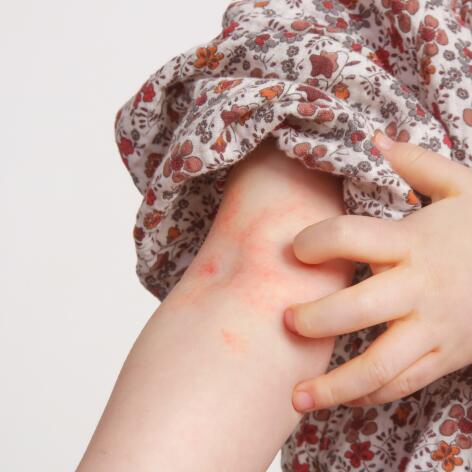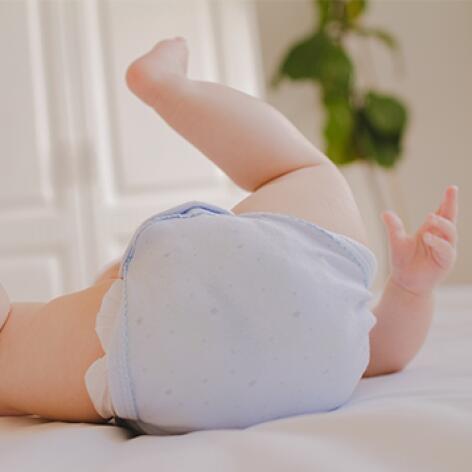Psoriasis in children
- Living with eczema and psoriasis
- Psoriasis and eczema for children - rules for moisturizing
- Psoriasis and eczema in adults: suitable hygiene
- Adults - Care and anti-itching tips
- Children - Care and anti-itching tips
- Psoriasis and eczema in children: suitable hygiene
- Living with eczema and psoriasis: Adult
- Psoriasis and adult eczema - rules for moisturizing
- Living with eczema and psoriasis: Children
Psoriasis in children
It’s true that psoriasis is not very common in children. But it does exist, and its impact on their social life, particularly at school, should not be underestimated. Treatment should involve the young patient, their parents and the doctor.

Forms and locations of psoriasis in children
The most common form of psoriasis in children is, as in adults, plaque psoriasis. It is characterised by the formation of red, inflamed, symmetrical and well-defined plaques. It is most common on the faces of small children, but patches can also appear on the palms of the hands and soles of the feet, resulting in dry pulpitis. In this case, the fingertips become painful. The scalp can also be the site of flare-ups in the form of thick, sticky scales.
Diaper psoriasis
The most common form of psoriasis in infants under 2 years of age is called "diaper psoriasis." It starts in the folds of the buttocks and can spread to the whole area under the diaper. The psoriasis then takes the form of a well-defined diaper rash with little scaling. In rare cases, it may persist or appear later in children and adolescents. In this case, it appears as patches on the external genitalia.

Psoriasis, a difficult condition for school children
Psoriasis can be a source of stigma and ridicule and can make life at school difficult for children. A better understanding of the disease will help them to live with it better.
Suffering at school
When it’s located on the face, neck or limbs, psoriasis can lead to teasing from peers. If the skin condition appears on the fingertips, writing will be complicated... In teenagers, genital psoriasis can hinder their love life. So many inconveniences linked to a disease that is still too little known.
Making the disease acceptable.
The treatment must, of course, be adapted to the age of the child and have one objective: to help them better understand the disease. The child will be more comfortable talking about it, downplaying it and leading as normal a social life as possible. Advice and support from their parents and doctor will guide them to live like other children.
FRIENDLY (AND EXPERT) ADVICE
"I've been living with severe psoriasis since I was 4 years old. I have been the victim of many humiliations. Children at school who wouldn't hold my hand, lifeguards who asked me to leave the pool so I wouldn't infect everyone..."
Sonia
FRIENDLY (AND EXPERT) ADVICE
The importance of treatment compliance
Some systemic drugs – which act on the whole body – may be considered in the therapeutic strategy for children. In this case, they are prescribed according to the specificities and contraindications related to age. However, treatment is essentially based on localised care with cortisone, vitamin A or D and emollients applied several times a day. A ritual that can become tedious for your little ones. However, moisturizing helps to reduce the formation of scales and decrease itching and discomfort. Support your child so that they take ownership of their routine and maintain it over the long term. To do this, try several emollient products before finding the one that suits your child. This will make the application easier and more acceptable.
Playing sports like everyone else
Even if a child has psoriasis, they should be able to play the sport of their choice. No type of sport is inadvisable. Even aquatic activities are encouraged. Sports help to maintain a healthy weight and good cardiovascular health. Mental health also benefits, as regular physical activity reduces stress and anxiety.

Playing YouTube videos requires the use of cookies in order to offer you targeted advertising based on your browsing For more information, please visit YouTube's « cookie » policy.
You have rejected Youtube's cookies and therefore you cannot view the video.
You can change your choices by clicking on « Cookie Settings » and accept Youtube's cookies to enable the video.
You can change this setting and withdraw your consent at any time.
Our solutions to soothe psoriasis
Eau Thermale Avène products designed to soothe psoriasis
Which skin care routine should you adopt?
Identify what it really needs with the help of our experts and discover the most suitable skin care routine for you.
